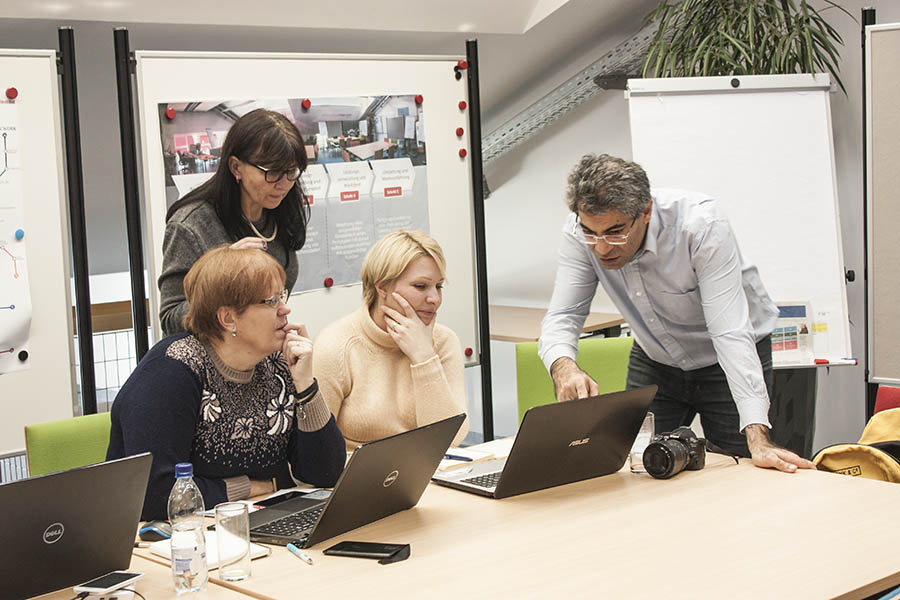Social media has become an essential tool for researchers to amplify the impact of their work, yet academics often struggle to leverage the potentials of social media impact, due to deeply rooted psychological, organizational, and cultural barriers. This article critically examines the disconnect between academia and social media, focusing on how these platforms can enhance visibility, public engagement, and societal impact—key metrics for European Union research funding. By exploring organizational psychology perspectives, it highlights the fears and misconceptions academics face, such as fear of judgment, discomfort with self-promotion, and resistance to the informal nature of social media. The discussion outlines practical steps and institutional support needed to foster resilience, adapt to the digital age, and bridge the gap between traditional academic practices and the dynamic world of social media.
Dr. Javad Zarbakhsh, Cademix Institute of Technology, Austria
Table of Contents
Introduction
In today’s rapidly evolving digital landscape, social media has emerged as a dominant force, influencing everything from communication to policymaking. For academics, however, this platform remains largely underutilized or mismanaged, leading to a significant gap in their ability to connect with wider audiences and achieve measurable impact. This disconnect is especially critical within the European context, where “impact” is a defining criterion for evaluating research funding and academic contributions. Despite its importance, academia continues to struggle with integrating social media as a core tool for dissemination and visibility, often due to psychological resistance and a lack of understanding of its unique dynamics.
The Missing Link: Social Media and Academic Impact
The European Commission and other funding bodies increasingly emphasize the importance of “impact” in research—how it influences society, industry, and policy. Yet, while traditional academic outputs like journal articles and conference presentations remain valued, their reach is often confined to a niche audience. Social media, by contrast, offers an unprecedented opportunity to bridge this gap, extending academic insights to policymakers, industry leaders, and the general public. However, academia’s reluctance to embrace these platforms results in a significant loss of potential impact.
This reluctance stems from multiple factors. Academics are trained to prioritize precision and correctness, values that often clash with the informal, fast-paced, and engagement-driven nature of social media. Furthermore, social media success requires adaptability to metrics of visibility—likes, shares, and followers—which are alien to the academic world of peer reviews and citations. This psychological and cultural disconnect limits academics’ ability to effectively engage with the broader public.

Psychological Barriers: The Academic Mindset
The academic mindset, shaped by years of rigorous training and peer validation, often clashes with the realities of social media. For many academics, platforms like Twitter, Instagram, or LinkedIn seem frivolous, their focus on quick, digestible content perceived as incompatible with the depth and nuance of academic work. This resistance is not just practical but deeply psychological—an ingrained discomfort with the idea of self-promotion, combined with a fear of misrepresentation or oversimplification of complex ideas.
Moreover, academics often feel unprepared to navigate the cultural nuances of social media, where engagement often trumps correctness. The idea that an informal or less scholarly tone could enhance reach is counterintuitive and uncomfortable. This lack of adaptability is a significant barrier, as it prevents academics from framing their work in ways that resonate with non-academic audiences.
The Disconnect: Academia and Social Media Dynamics
Social media thrives on accessibility, relatability, and immediacy. Yet, these are precisely the elements that academia struggles to adopt. Academic writing is dense, complex, and often jargon-heavy, making it inaccessible to most social media users. The highly specialized nature of academic work further compounds this issue, as researchers may find it challenging to translate their findings into content that is relevant and engaging to the general public.
Additionally, the hierarchical structure of academia often discourages risk-taking. Academics worry that a misstep on social media—whether a poorly worded post or a controversial opinion—could damage their professional reputation. This fear stifles creativity and innovation in online engagement, leaving many academics hesitant to experiment with platforms that could significantly amplify their reach.
Organizational Psychology Perspectives: Why Academics Struggle with Social Media
The hesitancy of academics to engage with social media is rooted in a complex web of psychological, cultural, and organizational factors. Despite the growing importance of digital platforms for visibility and outreach, academics often face barriers that stem from their professional training, institutional norms, and personal reservations.
Fear of Judgment and Risk to Reputation
Academics are deeply invested in their intellectual credibility, which is often tied to rigorous peer evaluation. The informal nature of social media contrasts starkly with this, leading to a fear of being misjudged. Researchers may hesitate to post online, worried about being misunderstood by their peers, students, or the general public. This fear is particularly strong for those in fields where controversial or complex topics are frequently misrepresented.
Imposter syndrome—a pervasive issue in academic circles—exacerbates this reluctance. The feeling of being “not good enough” can make social media engagement feel like an added pressure rather than an opportunity. For early-career researchers, this fear is amplified by concerns about how senior colleagues might perceive their online presence.
The Discomfort of Self-Promotion
Academia traditionally values modesty, where work is expected to speak for itself. This clashes with the self-promotional nature of social media, where visibility often depends on frequent and strategic posting. For many academics, promoting their achievements feels at odds with their training and ethos, creating a psychological barrier to engagement.
Organizational psychology research highlights this tension, showing that people in evaluative environments like academia often perceive self-promotion as inauthentic, even when it is necessary.

Psychological Scenarios of Fear and Failure in Social Media Engagement for Academics
The hesitancy among academics to actively engage with social media is often rooted in deep-seated fears and previous negative experiences. While the organizational and cultural barriers are significant, the psychological challenges faced by academics in navigating social media also play a critical role. This section explores a few common scenarios that illustrate the fears and potential pitfalls academics encounter, providing a deeper understanding of the resilience required to succeed in the dynamic and unpredictable world of social media.
Fear of Initiating Discussions on Social Media
One of the most prevalent psychological barriers is the fear of starting a conversation on social media. Unlike academic conferences or journal publications, where the audience is specialized and relatively predictable, social media platforms expose researchers to a diverse, and often unfiltered, audience. This can create a sense of vulnerability, as academics worry about how their posts might be received or misinterpreted.
Example Scenario:
A researcher in climate science posts a thread summarizing their recent findings. Despite the thread’s scientific rigor, it receives backlash from climate change skeptics, who flood the comments with misinformation and personal attacks. The experience leaves the researcher hesitant to post further, fearing a repeat of the hostility.
Such fears are exacerbated by the informal nature of social media, where discussions can quickly spiral out of control. Academics, accustomed to structured debates and peer-reviewed environments, may struggle to handle the unpredictability of online discourse.
Fear of Insufficient Material for Social Media
Another common concern is the perceived lack of content suitable for social media. Many academics believe their work is too complex, nuanced, or niche to fit into the short, engaging formats required by platforms like Twitter, Instagram, or LinkedIn. This fear is often compounded by the pressure to post regularly to maintain visibility.
Example Scenario:
A PhD student working on a highly specialized topic, such as quantum computing, feels their research is too technical for a general audience. They hesitate to post about their work, believing it would either be too difficult to simplify or fail to attract interest.
This reluctance stems from a misunderstanding of social media’s purpose. Rather than presenting complete studies, platforms can be used to share snippets of ongoing work, reflections, or even challenges faced during research. The fear of not meeting an imagined standard of “social media-worthy” content often prevents academics from experimenting with these platforms.
Fear Rooted in Previous Negative Experiences
Negative experiences on social media can leave lasting scars, discouraging academics from further engagement. Public criticism, trolling, or even mild disagreements can feel disproportionately impactful in the context of a platform where interactions are immediate and often amplified.
Example Scenario:
A junior academic posts a blog link summarizing their research, only to have a senior colleague publicly critique their writing style in the comments. Although the critique is mild, it undermines the academic’s confidence and discourages them from sharing future work.
In academia, where professional validation is paramount, such experiences can feel devastating. The fear of being publicly judged or ridiculed creates a psychological hurdle, especially for early-career researchers who are still building their professional identity.
Fear of Reopening Old Wounds: The Legacy of Past Misjudgments
For some academics, a single negative social media experience can cast a long shadow over their willingness to engage. Misjudgments made in earlier posts, whether perceived or real, may feel like permanent stains on their professional reputation.
Example Scenario:
A professor posts an opinion about a trending topic, only to realize later that the statement was factually inaccurate. Despite issuing a clarification, the incident attracts criticism and becomes a focal point in their online presence. Years later, the professor remains reluctant to engage on social media, haunted by the memory of the backlash.
The permanence of online interactions can amplify this fear. Unlike academic journals, where errors can be corrected in subsequent publications, social media posts are often preserved indefinitely, creating a lasting sense of exposure.
The Need for Resilience in Social Media Engagement
What unites these fears is the lack of resilience often seen in academics when dealing with social media challenges. Academia is a relatively insulated environment, where debates are structured, audiences are specialized, and reputations are built over years of careful work. Social media, by contrast, requires an ability to handle rapid feedback, often from diverse and uninformed audiences. The psychological shift needed to navigate this space effectively is substantial.
Resilience involves not only learning to manage criticism but also reframing negative experiences as opportunities for growth. Academics must adapt to a mindset where engagement—whether positive or negative—can amplify their work’s visibility. Mistakes, when handled with transparency and humility, can even enhance credibility by showcasing accountability.
Toward a Supportive Framework for Overcoming Fears
To address these fears, institutions and academic networks must provide structured support, including training in digital communication and strategies for managing online interactions. Psychological resilience should be a key component of these programs, helping researchers build confidence in their ability to navigate social media challenges.
The Cost of Inaction: Europe’s Missed Opportunities
For European academia, this disconnect has far-reaching consequences. Social media offers a powerful tool for engaging with diverse stakeholders, from policymakers and businesses to students and the general public. By failing to leverage these platforms, academia not only misses out on visibility but also weakens its societal impact—a key criterion in European funding frameworks. Without a strong social media presence, academic work risks being overshadowed by less rigorous but more accessible voices, diminishing its influence on policy and public discourse.
Bridging the Gap: Toward a New Academic Culture
To address these challenges, academia must fundamentally rethink its approach to social media. This begins with acknowledging its importance as a tool for impact, not just an optional add-on. Training programs that equip researchers with the skills to navigate and succeed on social media are essential. These programs should focus not only on technical aspects—such as creating engaging posts or analyzing metrics—but also on psychological barriers, helping academics reframe their perception of social media as a vital part of their professional toolkit.

Toward an Engaged Future: A Call to Action
The academic struggle with social media impact is not merely a communication issue; it reflects a deeper cultural resistance to change. As the digital age continues to reshape how information is shared and consumed, academia must adapt to remain relevant and influential. For European researchers, embracing social media is not just an opportunity but a necessity, critical for achieving the levels of impact demanded by contemporary funding bodies.
A potential solution lies in integrating continuing education programs that specifically address the challenges faced by academics in navigating social media. These programs, offered by impact advisors and social media experts with academic backgrounds, can provide tailored training to early-stage investigators, postdoctoral researchers, and professors. Such programs aim to equip academics with the necessary tools, strategies, and resilience to thrive in the digital age. By addressing psychological barriers, enhancing technical skills, and offering structured guidance, these programs create a supportive framework for academics venturing into the world of social media.
An example of such initiatives is the Acceleration Programs and Weiterbildung offered by the Cademix Institute of Technology. These programs focus on bridging the academic-industrial divide, helping researchers adapt to the informal yet impactful world of social media success while maintaining their scholarly integrity. Through hands-on workshops, personalized coaching, and peer collaboration, participants learn to craft compelling narratives, leverage platform-specific strategies, and effectively engage diverse audiences. Additionally, resilience-building sessions ensure academics are better prepared to handle criticism, judgment, or the fast-paced dynamics of social platforms.
For academia to remain relevant, institutions must foster a culture that values and incentivizes social media engagement. This includes recognizing impactful online activity in performance evaluations, providing funding for tailored training programs, and encouraging interdisciplinary collaboration between social media experts and academic leaders. By creating a robust infrastructure of support, institutions can empower academics to confidently embrace social media as a key tool for dissemination and professional growth.
Bridging the gap between academia and social media is not about replacing traditional academic practices but about complementing them with strategies that align with modern communication norms. With the right mindset, institutional backing, and tailored education programs, academia can ensure its voice is not only heard but amplified in the global conversation. Without these efforts, the risk is clear: academia will remain isolated, its contributions overshadowed in the ever-expanding digital landscape.
References and Further Reading
- Mollett, A., Moran, D., & Dunleavy, P. (2017). Communicating Your Research with Social Media: A Practical Guide to Using Blogs, Podcasts, Data Visualisations, and Video. Sage Publications. Available at: https://uk.sagepub.com/en-gb/eur/communicating-your-research-with-social-media/book246733
- Priem, J., & Hemminger, B. M. (2010). Scientometrics 2.0: Toward New Metrics of Scholarly Impact on the Social Web. First Monday, 15(7). DOI: https://doi.org/10.5210/fm.v15i7.2874
- Sugimoto, C. R., Work, S., Larivière, V., & Haustein, S. (2017). Scholarly Use of Social Media and Altmetrics: A Review of the Literature. Journal of the Association for Information Science and Technology, 68(9), 2037–2062. DOI: https://doi.org/10.1002/asi.23833
- Haustein, S., Peters, I., Sugimoto, C. R., Thelwall, M., & Larivière, V. (2014). Tweets as Impact Indicators: Examining the Implications of Social Media for Scholarly Communication. Journal of the Association for Information Science and Technology, 65(4), 656–669. DOI: https://doi.org/10.1002/asi.23101
- Veletsianos, G. (2016). Social Media in Academia: Networked Scholars. Routledge. Available at: https://www.routledge.com/Social-Media-in-Academia-Networked-Scholars/Veletsianos/p/book/9781138950261
- McClain, C. R., & Neeley, L. (2015). A Critical Evaluation of Science Outreach via Social Media: Its Role and Impact on Scientists. F1000Research, 3, 300. DOI: https://doi.org/10.12688/f1000research.5918.1
- Bik, H. M., & Goldstein, M. C. (2013). An Introduction to Social Media for Scientists. PLoS Biology, 11(4), e1001535. DOI: https://doi.org/10.1371/journal.pbio.1001535
- Kjellberg, S. (2010). I Am a Blogging Researcher: Motivations for Blogging in a Scholarly Context. First Monday, 15(8). DOI: https://doi.org/10.5210/fm.v15i8.2962

